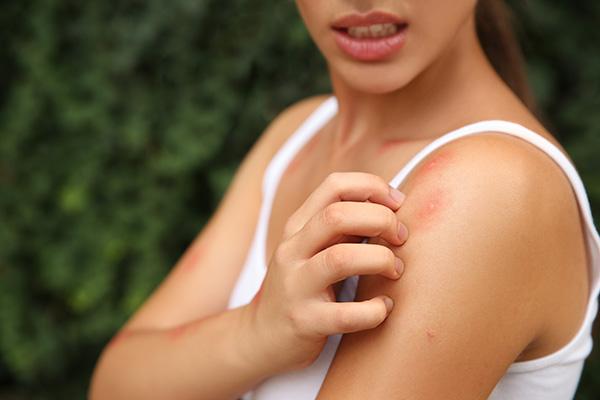Mosquito & Tick-Borne Disease Program

Franklin County’s Mosquito- and Tick-borne Disease Program works hard to mitigate the risk of mosquito- and tick-borne diseases in our community through surveillance, control and education.
In 2001, the Pennsylvania Department of Environmental Protection (DEP) launched a mosquito surveillance program to track and manage West Nile Virus. Since its creation, the program has worked to mitigate the risk of West Nile Virus and other mosquito-borne diseases through surveillance, control and education. DEP introduced a tick surveillance program in 2018 to learn more about tick-borne disease prevalence, habitats and species distribution.
Each year, Franklin County applies for a DEP grant to cover the cost of mosquito and tick work in the county. In 2022, DEP added areas of Bedford, Fulton and Huntingdon counties to Franklin County’s surveillance area.
Control efforts focus on both large- and small-scale areas of concern. Although the county can offer assistance through education on how to eliminate breeding habitats, this program does not provide private extermination for individual homes. Instead, Franklin County staff seek out mosquito habitats that have the potential to develop into large-scale mosquito problems and then work to eliminate the larval source before it becomes an issue. Each breeding habitat is evaluated for the best possible control type, which can include using environmental factors to naturally eliminate the source or by using pesticides.
If mosquitoes are breeding and emerging faster than a larval source can be controlled, issues with adult mosquitoes will occur. Control methods are determined based on the species and number of mosquitoes trapped during surveillance and the prevalence of West Nile Virus in a concentrated area. A backpack barrier spray, which is applied to dense, non-flowering vegetation and can last up to four weeks, may be used to control high mosquito populations in a localized 1-2 acre area.
Another option is a truck-mounted spray, which is employed when the number of mosquitoes and amount of West Nile Virus in an area reaches a specified threshold. Sprays are conducted at dusk when mosquitoes are most active and when non-target species, like bees and pollinators, are not. The product is a fine mist that dissipates after about 15 minutes and is roughly 2,250 times more toxic to mosquitoes than it is to humans. County staff typically spray 1 oz. per acre, which equals 1 gallon of spray spread over 128 acres. To put this in perspective, that’s less than a shot glass size of pesticides spread out over an area roughly the size of a football field. All truck-mounted sprays are announced publicly at least 24 hours in advance on the county’s website, social media pages and through local media outlets.
How To Control Mosquitoes Around Your Home And Property
Many mosquito species can be kept at bay, especially the Asian Tiger Mosquito, if residents do their part. Nuisance mosquitoes will typically originate from your own property or a neighboring one. To eliminate mosquitoes, homeowners should ensure there is no standing water around their homes. Something as small as a water-filled bottle cap can breed mosquitoes. Below is a list of places and objects that can commonly hold water and breed mosquitoes:
- Puddles and flooded areas in your yard
- Tree holes
- Tarps
- Buckets
- Clogged rain gutters, downspouts and corrugated pipes from downspouts running uphill
- Flower pots
- Bird baths
- Tires
How You can Help
Residents can report new breeding sites so those areas can be surveyed. Sharing information about standing water or high mosquito activity is encouraged. To report a new site, contact Franklin County Mosquito- and Tick-Borne Disease Specialist Jason Goetz at jgoetz@franklincountypa.gov or 717-261-3855.
For more information on Pennsylvania’s West Nile Virus Control Program, click here.
Through the tick surveillance program, Franklin County staff evaluate tick species, quantities and presence of certain diseases in public-use areas. Ticks are collected through a method called “dragging” where a weighted white piece of felt is dragged over a tick habitat and then examined for ticks. The main focus of the tick surveillance program is the black-legged tick – more commonly known as the deer tick – which can transmit Lyme disease and other pathogens to humans. Pennsylvania currently leads the U.S. in the number of Lyme disease cases each year.
There are no effective spraying methods to control ticks. The most effective way people can avoid tick-borne diseases is by spraying themselves with tick repellent before entering tick habitats and by thoroughly checking themselves for ticks when exiting habitats.
For more information on tick surveillance testing in Pennsylvania, click here.
Spotted lanternfly (SLF) is an invasive insect that has spread throughout Pennsylvania since its discovery in Berks County in 2014. SLF feeds on the plant sap of many different plants, including grapevines, maples, black walnut and other important plants in Pennsylvania. If you see SLF, help stop it in its tracks!
The Pennsylvania Department of Agriculture is in charge of spotted lanternfly surveillance, management and decision making. Penn State Extension offices across the state are in charge of education and have great resources on how homeowners can manage the pest on their properties. Franklin County and local municipalities have no oversight or funding when it comes to the spotted lantern fly.
Penn State Extension provides additional information on the spotted lanternfly. To learn more, click here.
